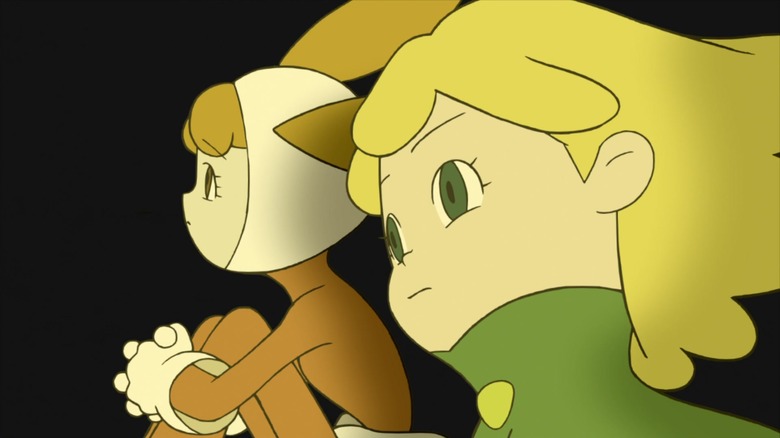
(Welcome to The Daily Stream, an ongoing series in which the /Film team shares what they've been watching, why it's worth checking out, and where you can stream it.)
The Series: "Kaiba" (2008)
Where You Can Stream It: Crunchyroll
The Pitch: In the world of "Kaiba," memories are transferable and bodies sell to the highest bidder. A young man named Warp wakes up with no memories and a hole in his chest. Around his neck is a locket holding the photo of a woman he doesn't recognize. Buffeted by the winds of fate, he is cast from body to body across the galaxy as his memory slowly returns. Along the way, Warp encounters rogues, innocents, and ordinary people — a young girl whose family sold her body for food, a corrupt policeman who would die for love, a hapless old lady, the memory-eating Kaiba plant, and the woman in the photo, of course. Like "Altered Carbon" crossed with "The Little Prince," "Kaiba" is a story reminiscent of the classics that looks like absolutely nothing else.
Why It's Essential Viewing
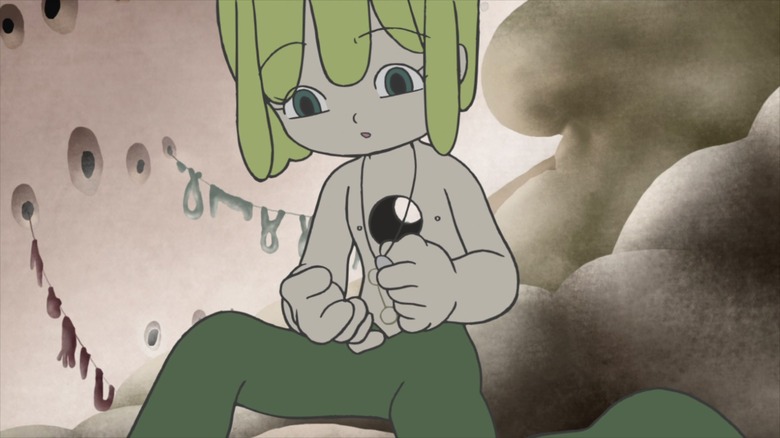
This year saw the US release of Masaaki Yuasa's final film, "Inu-Oh." Yuasa has been best known in recent years for his work at the studio Science Saru, including the film "Ride Your Wave" and the television series "Keep Your Hands Off Eizouken!" Both these works are pretty good, but exhibit restraint that is nowhere to be found in "Inu-Oh." "Inu-Oh" is a rock opera, a celebration of music, dance, and pure animation. For any other artist, the film would be a career-defining experiment. For Yuasa, it was a return to form. He and his friends have always worked outside the norm of the Japanese anime industry, but his early work was even weirder. Just look at "Mind Game," the first film he ever directed and a major influence on "Everything Everywhere All at Once."
Many of Yuasa's early works remain inaccessible outside of pirate fan translations. The "Shin-chan" movies, to which he contributed animation and design, have never been released in the United States, and no licensor has ever touched his horror romance series "Kemonozume." But "Kaiba," his science fiction series that aired on the famous WOWOW block in 2008, is available in the United States courtesy of boutique seller Discotek Media. "Kaiba" is not as outrageous as "Mind Game" or as coherent as his later TV adaptations like "The Tatami Galaxy," yet it remains my favorite work of his — a lovely science fiction story far greater than the sum of its parts.
To Feel Your Warmth And Love
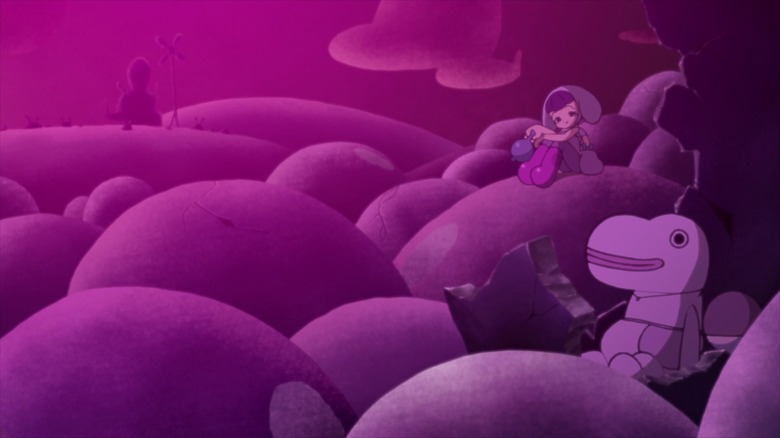
"Kaiba" takes place in a charming cartoon universe reminiscent of "The Little Prince," or Osamu Tezuka's "Astro Boy." Characters take many shapes and sizes, including gangly humanoids, robots, and even a big stuffed hippo. Memories float through space like little pieces of candy corn and entering somebody's brain is as simple as firing a special gun at their head, then walking through a door in the air. Films that explore memory such as "Eternal Sunshine of the Spotless Mind" must rely on tricks to evade the limitations of live action, but "Kaiba" faces no such limitations. It takes its dystopian world seriously but keeps finding fun new ways to model its workings through abstraction and exaggeration, rather than strict realism.
Just like the works of Osamu Tezuka, "Kaiba" tells a surprisingly adult story through its cartoony characters and aesthetic. The second episode features the cold-blooded killing of a stowaway by a police officer, and just a few minutes later, a woman clones the main character's body in order to have sex with herself, only to explode in a fit of passion. Future episodes delve into increasingly fraught questions of bodies and personhood. What does healthcare look like in a world without death? If bodies are too expensive, is it possible to live without one? How reliable is the self when memories are so easily changed?
And The Tree Is Standing Still
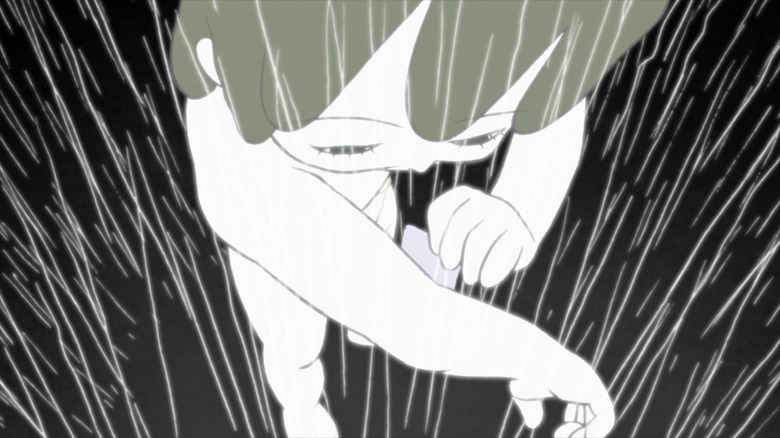
The unusual visuals and melancholy storyline of "Kaiba" have led to it being labeled as inaccessible by some, but Masaaki Yuasa has always worn his heart on his sleeve. His cartoons explore love in its various forms — from bonds of friendship in "Ping Pong" to the joys of artistic collaboration in "Keep Your Hands off Eizouken!" At the center of "Kaiba" is a pair of star-crossed lovers and their eventual reunion, but the series is also a story of love in many other forms. A mother's buried love for her daughter, an old woman's nostalgic longing — even the show's villains are humanized through their relationships with others. "Kaiba" is a story about how cruel systems of inequality cannot crush our fundamental need to connect.
Surrounding it all is the music, which is fantastic from beginning to end. Like the series itself, it is nostalgic and yet subtly ominous, evoking both whimsy and dread as the series requires. My favorite piece is "The Tree Song," first introduced at the end of the third episode. It is brought back multiple times throughout the show in different forms and wrings tears out of me every single time. The composer, Kiyoshi Yoshida, contributed musical scores to just a handful of anime films and television series produced by the studio Madhouse in the early 2000s. It's a reminder that while anime is not necessarily any better or worse now than it was back then, collaborations between artists and teams might last for just a few short years.
Carry Me Away
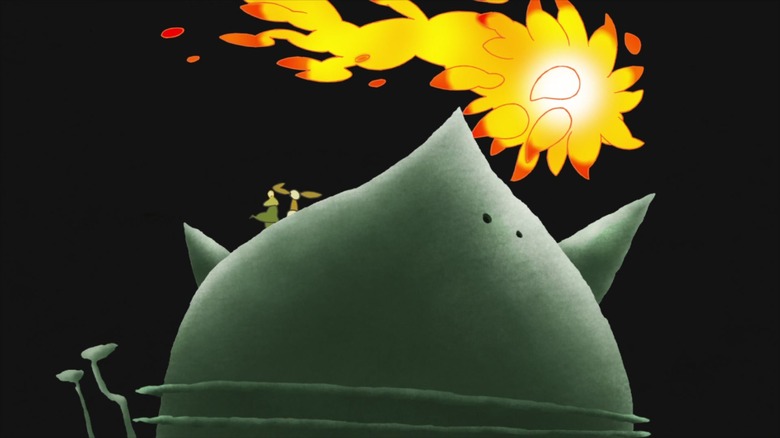
"Kaiba" is at its best in its early episodes, as Warp travels from planet to planet. The series loses a step when the plot rears its ugly head. The central romance still works, and late plot twists pay big dividends on rewatch, but expanding the scope of the narrative from a personal story of discovery to a political drama breaks the pacing. The last few episodes are so stuffed with incidents that they can't help but seem inelegant compared to the show's early successes. Masaaki Yuasa gradually moved away from original series to adaptations in his television work; his endings to series like "Ping Pong" and "The Tatami Galaxy" show a surer hand than the messy, "Evangelion"-inflected ending to "Kaiba."
Even so, nobody ever said that love had to make sense. Discovering "Kaiba" as a teenager taught me just how vast the world of anime could be. A medium that could contain blockbuster young adult fiction like "Code Geass" or elaborate fantasy like "Spirited Away" even had room for something deeply idiosyncratic like this. "Kaiba" could only exist in its beauty and ugliness because of a series of coincidences, like Yuasa's professional connections, the ambitions of Madhouse at the time, and the existence of the risk-taking WOWOW block. Plus, I'm not the only one who loves "Kaiba." When I rewatched the series for my local anime club this year, a friend of mine told me it was a new favorite of his. It could be yours, too.
Read this next: 18 Underrated Anime Movies You Really Need To See
The post The Daily Stream: Let Kaiba Fill the Hole in Your Heart With Love appeared first on /Film.
